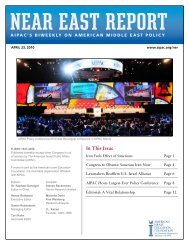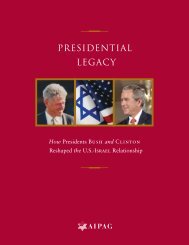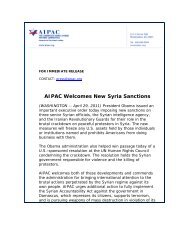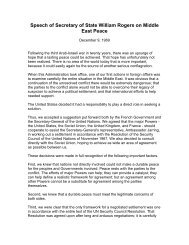2013 Briefing Book - Print Version - Aipac
2013 Briefing Book - Print Version - Aipac
2013 Briefing Book - Print Version - Aipac
You also want an ePaper? Increase the reach of your titles
YUMPU automatically turns print PDFs into web optimized ePapers that Google loves.
RELATIONSHIP<br />
The agreement has also served as a tool of economic diplomacy, creating the conditions for<br />
peace and helping to integrate Israel more fully into the region. Using the agreement as legal<br />
underpinning, the U.S. and Israel signed individual agreements with Jordan (1996) and Egypt<br />
(2004), creating Qualifying Industrial Zones (QIZ) where jointly produced goods are afforded<br />
duty-free access to the United States. Goods produced in the West Bank and Gaza Strip, when<br />
administered by the Palestinian Authority, also benefit.<br />
Bilateral trade has spiked in each case. QIZ factories in Jordan count almost 15,000 employees,<br />
representing $500 million per year in exports to the United States. More than 100,000 Egyptians<br />
are employed in more than 700 participating QIZ companies.<br />
U.S. Companies Flock to Israel<br />
The United States and Israel share a culture of innovation. American heavyweights such as Intel,<br />
Motorola, Apple and Google have capitalized on Israel’s entrepreneurial spirit and world-class<br />
talent pool, establishing major R&D centers throughout the country. With the most Ph.D.s and<br />
published scientific papers per capita in the world, Israel has become the preeminent foreign<br />
outpost for computer technology, telecommunications and software industries, with roughly 100<br />
U.S. companies active in Israel. More Israeli companies are traded on the NASDAQ than any<br />
country outside the United States and China. For example, Facebook recently acquired Face.com,<br />
an Israeli facial recognition software company that created the popular photo-tagging application;<br />
Apple recently acquired Anobit, an Israeli flash memory storage company.<br />
In 2006, esteemed investor Warren Buffet’s Berkshire Hathaway made its first-ever foreign<br />
acquisition, buying 80 percent of Iscar, an Israeli maker of precision blades and drills. When asked<br />
the reason for his interest in Israel—which, only weeks earlier, had fought a war with Hizballah in<br />
Lebanon—Buffet’s response pointed to the spirit that marks the economic drive of both the United<br />
States and Israel: “[Israel] had no advantages 50 years ago…. What they brought was brains and<br />
energy and look how it paid off…. They are the best that I’ve seen.”<br />
Eric Schmidt, chairman of Google Corporation, echoed that sentiment. “We should expect much<br />
more investment in high technology in Israel,” he said, adding: “For a small country, Israel will<br />
have an oversized impact on the evolution of the next stage of the technology we all use.”<br />
63








